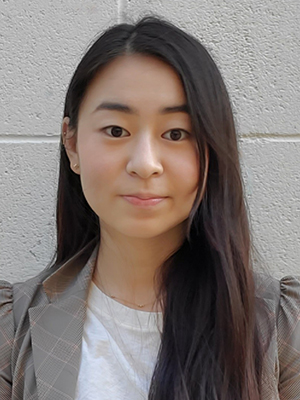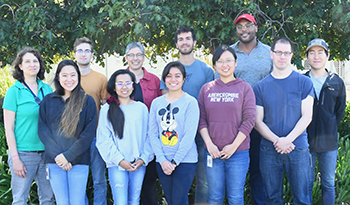 Yeram Hong |

Front row
(left to right): Ilea Chau, Jamie Calma, Yuritzy Rodriguez, Yuan Chen, Karl
Schreiber. Back row (left to right): Jana Hassan, Hunter Thornton, Jennifer
Lewis, Maël Baudin, Jacob Carroll-Johnson, Jack Kim. |
Yeram Hong
and Jennifer D. Lewis
Yeram Hong is an undergraduate at the University of California, Berkeley, in her
third year. She is double majoring in forestry and in genetics and plant
biology. From a young age, Yeram has been interested in the natural
environment, with a particular interest in plant biology. Her current research
interests include protein function in plant nuclear membranes and bacterial
plant pathology. Outside of academia, Yeram enjoys drawing, caring for her many
houseplants, and reading literary fiction.
Jennifer Lewis is a principal investigator at the U.S. Department of
Agriculture and an adjunct associate professor at UC Berkeley. Her lab studies
the plant immune system and its response to the bacterial pathogen Pseudomonas syringae.
The Lewis lab is committed to diversifying plant sciences. To encourage this,
we are carrying out interviews with prominent scientists in the field to
discuss their research and their perspectives on diversifying science.
Dr. Wenbo Ma
Dr. Wenbo Ma has been selected to receive the 2021 Ruth Allen Award from The American Phytopathological Society. This
award honors individuals who have made an outstanding, innovative research
contribution that has changed, or has the potential to change, the direction of
research in any field of plant pathology.
Dr. Ma currently holds a position as the senior group
leader at the Sainsbury Laboratory in Norwich, UK, where she is a leading
expert in the field of plant-microbe interactions. Her specialty is effector
proteins: these are proteins produced and delivered by microbial pathogens into
plant hosts, where they can directly manipulate host physiology and immunity.
After introduction into a host, effectors can overwhelm the immune system and
promote vulnerability to infection.
Effector genes are the fastest evolving feature of
pathogens, and Dr. Ma finds the evolutionary race between effectors and hosts
fascinating. She states, "One of [my personal interests] is coevolution. I
feel that effectors and pathogens always surprise us. They always come up with
amazing things, strategies, mechanisms, to fight back against the host."
Dr. Ma believes that effectors hold a key to unlocking more knowledge about
plant pathology: "If we know how effectors function in the host cell, then
we understand how pathogens become a pathogen, how they cause disease."
She also believes that once researchers can identify what pathogens attack in
their hosts, a more selective and strategic defense plan can be created to make
plants more resistant to the disease. Her eventual goal is to "use [the]
fundamental knowledge [she gains] to identify these fundamental principles in
disease and use this knowledge to develop strategies that enhance disease
resistance in crops."
Dr. Ma's current research focuses on effectors
produced by Phytophthora species, an oomycete pathogen
that is linked to a large variety of devastating diseases and that targets a
broad range of hosts. One such disease with a global impact is the late potato
blight, which can cause total crop failure if not properly dealt with in
fields. Dr. Ma was able to identify novel functions of Phytophthora
effectors. She found that many of these effectors perform suppressor activities
that can inhibit the activity of small interfering RNAs (siRNA) in plant
defense pathways. In normal situations, a plant infection can prompt siRNAs to
selectively target and deactivate alien nucleic acids introduced by pathogens.
However, in a plant infected by pathogens carrying these suppressor effectors,
this defense system is shut down. Although small RNAs are usually associated
with viral infections, the presence of Phytophthora
effectors that silence siRNA suggested that siRNAs are actually contributing to
plant defense against nonviral pathogens. From this discovery, Dr. Ma was able
to identify a specific class of plant siRNAs that are important for a nonviral
pathogen defense process called host-induced gene silencing. She is now
continuing this line of research to better understand "how this specific
class of siRNA is regulated during plant response to pathogens, and how we can
use this knowledge to implement this defense mechanism, which is quite
different from [other mechanisms]."
Dr. Ma is also pursuing another significant line of
research into the devastating citrus huanglongbing disease (HLB) caused by the
bacterium Candidatus Liberibacter asiaticus. Citrus HLB is different from
well-studied apoplastic pathogen systems because the bacteria colonize phloem
tissue. Therefore, much of the knowledge gained by studying apoplastic-type
pathogens may not apply. Interested in this new challenge, Dr. Ma proceeded to
conduct research on how to deal with this pathogen, which colonizes a unique
cellular environment. Through her work, Dr. Ma was able to identify a class of
proteases that most likely contributes directly to plant immunity within the
phloem. Currently, she is working on systematically characterizing effectors
from Ca. L. asiaticus and finding their targets in
the phloem or neighboring tissues. Her focus is on phloem colonization by the
bacteria, and she plans to use the knowledge of induced molecular events to
provide more sustainable solutions against citrus HLB.
While Dr. Ma has been a leader in her field of plant
pathology for many years, she did not originally intend to study the subject.
She received her bachelor's degree in general biology while attending college
in Beijing at the Chinese Academy of Science: Institute of Microbiology. During
her undergraduate studies, Dr. Ma participated in research and discovered her
passion for microbiology while studying under Dr. Huarong Tan, who worked on Streptomyces genetics. She then continued to pursue her master's
degree in microbial genetics under his mentorship. While studying in China, Dr.
Ma had the support of her parents in her career path, which she feels was very
fortunate:
I'm
quite fortunate or lucky [because] my parents were university professors. I grew
up in an environment where my parents were very supportive of me becoming a
professional…. I'm
very fortunate to have the support from my family and also my husband.
This level of support was not always the case in her
community, and Dr. Ma said, "I feel there was a lot of bias in the culture
of Chinese communities, especially at that time. Women were usually the
supportive role in the family or in society." Outside the circle of her
close family, Dr. Ma still experienced the criticism of people who questioned
her ability to balance her professional work and her expected familial duties
of raising children. But to this, she exclaimed:
Eventually,
these other opinions or comments from these people become a motivation rather
than discouragement. I began to think that this is nothing I should be stopped
by. I feel now, I almost have a responsibility [to be] that person that can
tell other people, other young female scientists, that this is quite normal. We
can all do it!
She believes that the presence of role models is very
valuable and strives to inspire others to seek their dreams. She commented:
It's
very important to have role models, to have those examples there so that the
younger generations of young kids can see this is nothing impossible. This is
very very possible. There are opportunities, and there are ways, and you can
get here also.
After finishing her master's degree in microbial
genetics, Dr. Ma pursued her Ph.D. degree in Canada at the University of
Waterloo, working with Prof.
Bernard Glick. He is a major pioneer in biotechnology, and his
expertise was the use of bacteria to remediate plants under stress conditions.
Under Prof. Glick, Dr. Ma worked on her Ph.D. thesis, for which she isolated
beneficial rhizosphere bacteria that may help with plant growth from plants
growing in contaminated soil. After receiving her Ph.D. degree, Dr. Ma's
attention was captured by the groundbreaking research of Prof. David Guttman
at the University of Toronto, who, along with his colleagues, had published a
milestone paper on the identification of type 3 secreted effectors from the
bacterial pathogen Pseudomonas syringae.
This paper provided her with a much better understanding of the effector
repertoire produced by bacteria pathogens, and Dr. Ma was hooked. She worked
with Guttman as his first postdoc in Toronto and began her research on
pathogenic bacteria.
After the University of Toronto, Dr. Ma then pursued
an academic path in the United States, where she worked for 14 years as a
professor of plant pathology in the Department of Microbiology and Plant
Pathology at the University of California, Riverside. Of these 14 years as a
primary investigator, she stated that, "I'm very proud of not only our
solid science and the novel insights that it can provide, but how, through this
research, we were able to train some young scientists. And now, several of them
have their own independent research programs." During her stay at UC Riverside,
Dr. Ma trained more than 50 undergraduate students in her lab. She believes a
large part of the value of her research at UC Riverside came from her ability
to use it as a training program to encourage students, who she sees as the next
generation of scientists and researchers.
Dr. Ma believes that a large part of the beauty of
science is the collaboration that occurs behind the scenes, as doing research
gives her many opportunities to work with collaborators, colleagues, students,
postdocs, and staff scientists. She stated, "I really like working
together with people of different expertise and strengths, and I think it is
more important than ever to work together." She enjoys the diversity of
different perspectives and people within science working together, commenting, "I
think that's my favorite part of research."
Along with her love of collaboration, she is also
passionate about providing resources and opportunities for anyone of any
background to pursue science. She emphasized the need for this, stating, "We
need to provide opportunities. We need to really reach out to people, and I
want to emphasize the importance of providing research opportunities…as early as possible
when they are in high school, middle school, or even earlier." She
believes there are good programs available to specifically support
underrepresented minority groups and women that encourage them to pursue
science and provide resources for them to perform research, such as summer
internship programs. Dr. Ma believes that "we will see fruit from all
these programs in some years. Nothing can happen overnight, but this requires
continuous proactive effort."
For Dr. Ma, research is an ongoing job that does not
end after working hours. She states, "[Research] is not a 9 to 5 job. I
spend time during the weekends, in the evenings; I still spend the time I have
[doing] something research-related." However, in the free time she gives
herself, Dr. Ma spends much of it with her husband and two children. She enjoys
seeing different landscapes and likes to hike with her family on the weekends.
Dr. Ma is also an avid sports fan and is currently keen on the soccer scene of
the United Kingdom where she is now living.
